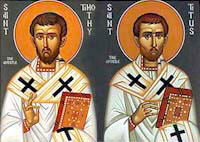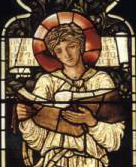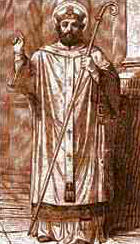Catholic Schadenfreude
I grieve over the prevalence of the culture of Schadenfreude that modern technology facilitates. Schadenfreude is a kind of perverse delight taken in the weaknesses, falls from grace, or misfortunes of another. Why is there a frenzied rush, even among some Catholics, to point to the latest scandal, to comment on it, and discuss it? What is there in us that prompts us to take a morose delight in uncovering the sins of others? I often think of this wonderful story from the sayings of the Desert Fathers:
Brother, Be Careful
There was a brother who kept a woman in his cell. The other fathers decided to go and expel him from the monastery. An abba heard about this and visited the brother beforehand. The brother hid the woman in a basket, before the abba came in the door. The abba then proceeded to sit on top of the basket and converse with the brother until the other fathers came to visit. The abba ordered the other fathers to search the cell and find this woman. Not finding her, because the abba (who had a gift of seeing hidden things) was sitting on the basket containing her. The abba then chastised the fathers for falsely accusing the brother and judging him. They asked for forgiveness and left. Then the abba got off the basket and told the brother, "Brother, be careful" and left.
Interventions
There are, of course, grave situations in which one is bound, as a matter of justice or to protect the vulnerable, to intervene in the matter of another's sin, but this should always be done with the utmost discretion and respect for all concerned. In the Gospel, Our Lord provides us with a plan of intervention:
If thy brother shall offend against thee, go, and rebuke him between thee and him alone. If he shall hear thee, thou shalt gain thy brother. And if he will not hear thee, take with thee one or two more: that in the mouth of two or three witnesses every word may stand. And if he will not hear them: tell the church. And if he will not hear the church, let him be to thee as the heathen and publican. (Matthew 18:15-17)
First of all, then, one must approach the offender and speak to him privately. If this fails to touch his heart, one should repeat the intervention in the presence of two or three witnesses. Only if this also fails to move the sin-sick brother's heart, should one have recourse to the Body of the Church. Only if he hardens his heart against the Church, that is, against the Body of Christ, should he be counted as the heathen and publicans. Most importantly, all of this takes place personally and in real time, not in the media that technology has placed at our finger tips as a two-edged sword.
The Scarlet Letter
Is it not reprehensible -- especially when one has no personal, face-to-face and heart-to-heart, knowledge of the individual concerned -- to call attention to the weaknesses and sins of a man? We live still in the accusatory culture of The Scarlet Letter. Even in Catholic circles, (redacted, which is a kind of Catholic (redacted) thrives. How different this is from the merciful culture of the Desert Fathers, so imbued with the spirit of the Gospel.
_03-thumb-400x306-13648.jpg)
Nothing Worse
The old men used to say, "There is nothing worse than passing judgement".
Abba Makarios
They said of Abba Makarios that he became as it is written a god upon earth, because just as God protects the world, so Abba Makarios would cover the faults that he saw as though he did not see them, and those which he heard as though he did not hear them.
If You Are Chaste
Abba Pastor said, "Judge not him who is guilty of fornication, if you are chaste, or you will break the law like him. For He who said, "Do not commit fornication," said also "Do not judge."
Abba Moses
A brother in Scetis committed a fault. A council was called to which Abba Moses was invited, but he refused to go to it. Then the priest sent someone to him, saying, "Come, for everyone is waiting for you". So he got up and went. He took a leaking jug and filled it with water and carried it with him. The others came out to meet him and said, "what is this, father?" The old man said to them, "My sins run out behind me, and I do not see them, and today I am coming to judge the errors of another." When they heard that, they said no more to the brother but forgave him.
Where Do You Want Me to Throw Him?
One day Abba Isaac went to a monastery. He saw a brother committing a sin and he condemned him. When he returned to the desert, an angel of the Lord came and stood in front of the door of his cell, and said, "I will not let you enter." But he persisted saying, "What is the matter?" And the angel replied, "God has sent me to ask you where you want to throw the guilty brother whom you have condemned." Immediately he repented and said, "I have sinned, forgive me." Then the angel said, "Get up, God has forgiven you. But from now on, be careful not to judge someone before God has done so."
Abba Poemen
A brother asked Abba Poemen, "If I see my brother sin, is it right to say nothing about it?" The old man replied, "whenever we cover our brother's sin, God will cover ours; whenever we tell people about our brother's guilt, God will do the same about ours."
Abba Poemen said, "If I see my brother sin" -- today one may not see one's brother sin, but one can read about it, often in lurid detail. How much more, then, are we bound to cover our brother's sin and observe silence concerning his guilt.
A Favourite Story of Mine
I could bring forth saying after saying and story after story from the lives of the Desert Fathers, for theirs was a culture of mercy, marked by the meekness of the Heart of Jesus. There is, nonetheless, one final story from the Orthodox Christian East that I must share because I so love it.
Once there was a priest who got drunk on Saturday night and stayed very drunk well into Sunday morning. His intoxication notwithstanding , the poor priest rose the next day and staggering, set out for church to serve the Divine Liturgy. An Angel, sent by the Lord, stopped him in his tracks, however, and tied him to a tree, lest he go into the church, and approach the altar, and bring disgrace upon himself and upon his holy priesthood.
When his wife went into church, she saw him at the altar, serving the Divine Liturgy, and was struck by the unusual radiance and beauty of his countenance. Leaving church, after the Divine Liturgy, she was making her way home when she came upon her husband tied to a tree! "Batushka!" she said, "how is it that you are tied to this tree when I saw you, only moments ago, serving at the altar?" "Matushka!" he replied, "An Angel of the Lord stopped me on my way to church and tied me to this tree, promising to assume my likeness and replace me at the altar this morning, lest my drunkenness bring shame upon me and upon my holy priesthood." "Verily," said his wife, "I saw you at the altar, but your countenance was like that of an angel, and the beauty of it more than I ever remember seeing."
In a Vessel of Clay
The story does not recount whether or not the wife untied her husband from the tree. The meaning of the story is that, no matter how sinful a priest may be, the indelible character of the holy priesthood engraved upon his soul by the Holy Ghost is, at all times and in all circumstances, worthy of profound respect. A poor drunken priest, a vessel of clay, was deemed worthy by God of the ministrations of an Angel, for the sake of the inestimable treasure hidden within.





 Timothy was Paul's dearest disciple, his most steadfast associate. He was converted during the apostle's first missionary journey. When Paul revisited Lystra, Timothy, though still very young (about twenty) joined him as a co-worker and companion. Thereafter, there existed between them a most intimate bond, as between father and son. St. Paul calls him his beloved child, devoted to him "like a son to his father" (Phil. 2:22). Of a kindly disposition, unselfish, prudent, zealous, he was a great consolation to Paul, particularly in the sufferings of his later years. He also assisted the apostle in the establishment of all the major Christian communities and was entrusted with missions of highest importance. Timothy was with Paul during his first Roman imprisonment. Paul made his self-sacrificing companion bishop of Ephesus, but the finest monument left him by his master are the two canonical Epistles bearing his name.
Timothy was Paul's dearest disciple, his most steadfast associate. He was converted during the apostle's first missionary journey. When Paul revisited Lystra, Timothy, though still very young (about twenty) joined him as a co-worker and companion. Thereafter, there existed between them a most intimate bond, as between father and son. St. Paul calls him his beloved child, devoted to him "like a son to his father" (Phil. 2:22). Of a kindly disposition, unselfish, prudent, zealous, he was a great consolation to Paul, particularly in the sufferings of his later years. He also assisted the apostle in the establishment of all the major Christian communities and was entrusted with missions of highest importance. Timothy was with Paul during his first Roman imprisonment. Paul made his self-sacrificing companion bishop of Ephesus, but the finest monument left him by his master are the two canonical Epistles bearing his name.  St. Titus, a pagan by birth, became one of St. Paul's most illustrious disciples. He accompanied the apostle on several of his missionary journeys and was entrusted with important missions. Finally he came with St. Paul to the island of Crete, where he was appointed bishop. He performed this duty in accordance with the admonition given him, ". . . in all things show yourself an example of good works" (Tit. 2:7).
St. Titus, a pagan by birth, became one of St. Paul's most illustrious disciples. He accompanied the apostle on several of his missionary journeys and was entrusted with important missions. Finally he came with St. Paul to the island of Crete, where he was appointed bishop. He performed this duty in accordance with the admonition given him, ". . . in all things show yourself an example of good works" (Tit. 2:7). 

_03-thumb-400x306-13648.jpg)
